|
Early Days
Henry Goodman, called Harry, was born at Worthing Mine, near Adelaide, Australia, on Monday 18 October 1847. His father was Henry Goodman, a blacksmith, who worked in the mine. His mother was Ann nee Nicholls. His mother's death certificate states that she and Henry Goodman (senior) were married in Wales, but it seems not improbable that they were never married.
They had only just arrived in Australia when Harry was born. The ship Aboukir had left London on 30 May 1847, passing Plymouth on 1 June. They probably boarded the ship at Plymouth. They arrived at Port Adelaide on 4 September. Henry is registered as a "Foreign Birth" - which seems a bit strange given that his father was from Cornwall and his mother was from Devon. When the daughters' births were registered, they are recorded as being Church of England. Harry was baptised in Adelaide on the 16th of December 1847. He was given the name of Henry Nicholls Goodman. He seemed never to have used the Nicholls part of his name, but it was often traditional for the first son to have the mother's maiden name as a middle name.
Harry had two sisters. Sophia was born on 6 January 1850 at Reedy Creek, South Australia. Ellen was born on 1 May 1852. Her mother registered her birth. She resided at Grenfell Street, Adelaide.
By the time of Ellen's birth, Harry's father was somewhere else in Australia searching for gold - possibly in Ballarat, Victoria. He died "outside South Australia" shortly after Ellen's birth - prior to September 1852. At least it seems that he died; there's a slight suspicion that he "simply disappeared"! Ann inherited a block of land in Adelaide and some money - provided she never remarried! Young Harry was almost five years old.
Not long after, probably in 1853, his mother Ann married Joseph Allen. His mother's death certificate states they were married in Adelaide, but there is no record of it. Possibly they never married, considering Ann's first husband's stipulation regarding inheritance. The three Goodman children - Henry, Sophia, and Ellen - took the surname of Allen.
Joseph Allen was a widow. In 1844 in Cornwall he had married Mary Ann Maddern. They had two daughters, Mary Ann and Catherine. In 1847, on the ship China, they arrived in Adelaide. Mary Ann, the wife, died in January 1849.
After the Allen/Goodman families combined, they shifted to the Cresswick/Spring Hill/Kingston area in Victoria, Australia. Joseph Allen lived on (and perhaps worked on) the cattle station owned by Mr Benjamin Hepburn. Hepburn himself had come from Adelaide, so it's possible that they knew each other in South Australia. It was on Hepburn's station as a child that Harry learnt to ride horses. It is reported too that his sister Sophia was no mean horse rider.
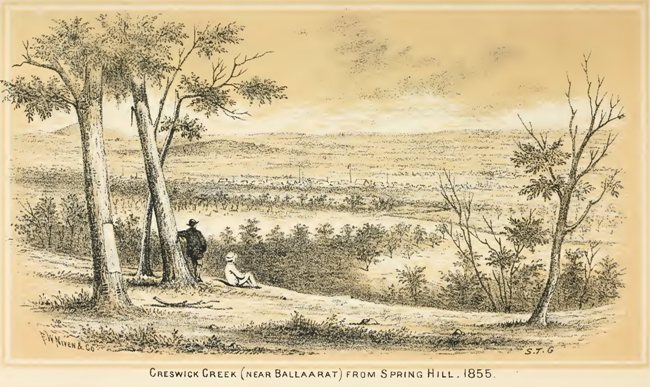
Joseph and Ann Allen were to have four further children while living in the Kingston area. Joseph was born in 1854, Maria in 1856, Thomas 1858, and Susanna in 1860.
By 1857, Joseph Allen was the inn keeper of the Stag's Head Hotel in Kingston next to Hepburn's station. A newspaper reports a theft in which young Henry Allen was a witness. Click HERE for the newspaper report.
The newspaper on a later date reported an arson attempt on a farm barn and the hotel. Young Henry Allen is reported as having found the arsonist's box of matches! Click HERE for the newspaper report.
By 1859, the Allen Family had moved in to the Forest Hill Hotel in Kingston. In March of that year, 11 year old Henry Allen ran away from home.
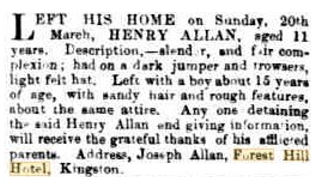
The Star, March 1859
This advertisement appeared for ten days
|
|
|
A Young Jockey
It would seem that this was the time that Harry's talent for horse riding was noted by Mr Harry Mount, a horse trainer. Harry was transferred from the care of his family and Hepburn's cattle station into Mount's tuition. It is possible that this was the time he changed from the name of Allen back to the name of Goodman.
In 1861 Harry won his first race at the first meeting ever held at the Ballarat Course. It is now called the Miner's Races. He also rode at Lake Lamotti, and at Yam Buck, in 1861. He could have ridden these races for trainer Harry Mount, or perhaps for the next trainer, Hurtle Fisher.
Harry transferred from Mount's stable to Maribyrnong Stud, now a suburb of Melbourne. The horse stud was owned by Hurtle Fisher. Hurtle Fisher was one of the Fisher Brothers who owned huge sheep and cattle stations around Adelaide and Melbourne.
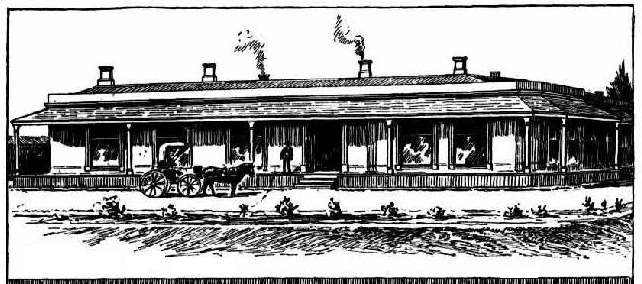
The house at Maribyrnong when Harry worked there
Harry's coming to New Zealand cannot be set at a definite date, for he was an Australian jockey riding horses at New Zealand race meetings for Australian horse owners. It was in 1862 that he first came to Dunedin. He would have been about fifteen years old. He was engaged to ride Kauri Gum in a match for 500 pounds a side against Falcon, an Australian horse, to be ridden by T.Hayes, an Australian horseman. A Mr Farquhar was the backer of Falcon. In 1864 Harry returned to Australia.
A little later, Harry returned to New Zealand with Messrs. Carson and James McKenzie, railway contractors, who owned the horses Black Doctor, Antonelli, Partisan and Loddon. On Partisan, Harry won the Booth Handicap. On a horse called Young Alma he won the the Forced Handicap, and on Poison he won the Black Hurdle Race. At that time the 16 year old Harry weighed 5 stone 9 pounds.
There was a fuss about Poison - some thought it was a horse with a history. Early in the New Zealand racing scene the pedigrees of some horses were unknown. In fact, these horses were sometimes well known and successful Australian horses that had been shipped to New Zealand as "hacks", sometimes even disguised as circus horses, to race successfully in New Zealand under other names. This lies behind many statements made of Harry Goodman that he was always an honest horseman and could be trusted.
After these race meetings Harry returned to Australia. He came back to New Zealand soon afterwards in 1864. At the first of the Champion Meetings held in Canterbury, in January 1865, Harry came second on Antonelli in the Canterbury Cup. Harry rode again for Mr Carson of Dunedin, and then returned to Melbourne.
In Melbourne he continued to ride for Hurtle Fisher, and had the mount on Rose of Denmark, first favourite for the Melbourne Cup in 1865. It was Rose of Denmark's third attempt at the Melbourne Cup. She got 3rd place in 1863. In 1865, when Harry rode her, she was unplaced. Still riding for Hurtle Fisher, Harry finished second on the Ascot Vale Stakes on Seagull, but was declared the winner owing to another jockey, Dan O'Brien, on Fishhook, having gone inside a post.
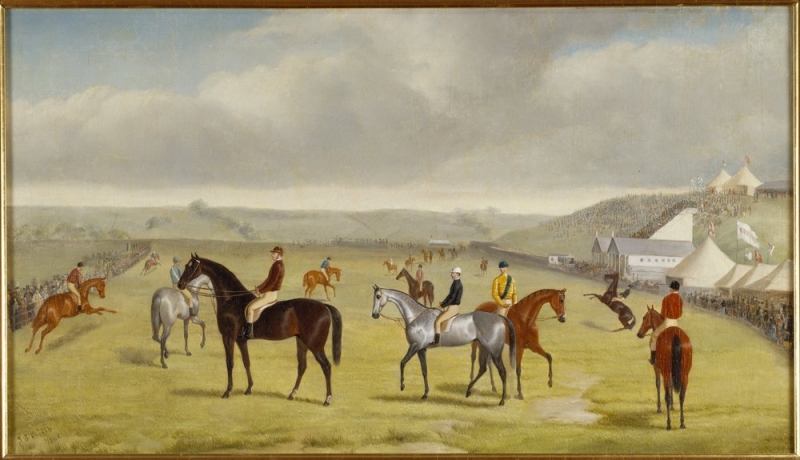
The field at Melbourne 1865. Which one is Harry?
Harry had a temper - a trait inherited by a few of his descendants. The incident with Dan O'Brien was part of a life-long argument that Harry had with O'Brien - climaxing in the one time Harry was reprimanded in racing circles. Harry and O'Brien were whip-lashing during a race. It occurred on the old Dunedin Silverstream racecource. David Corson and Mr Lee each owned a horse, and made a bet of 50 pounds that one would beat the other for places in the race. Dan O'Brien rode Mr Corson's Stormbird, and Harry was on Mr Lee's Firetail. Coming round the bend into the straight one of them bumped into the other. Immediately whips flashed out, but were not used on their mounts. They each thrashed each other most unmercifully; the horses swerved across the course, collided with Mounted Constable Bevin, and sent him and his white horse sprawling. Neither horse was placed, and a horse called Schoolboy won the race.
For a Mr Day, Harry won a hurdle race at Bendigo on Valentine, and was third on Beaufort in his first steeple chase there.
Harry returned again to New Zealand. This is possibly the time his mother Ann, step-father Joseph Allen, sisters Sophia Goodman and Ellen Goodman, his two step-sisters Mary Ann Allen and Catherine Allen, and his four half-brothers and sisters - Joseph Allen, Maria Allen, Thomas Allen, and Susanna Allen - came to Dunedin.
Having returned to New Zealand he rode Musician on the flat and over hurdles. He was with Mr W.C.Webb when he had Belle of the Isle, Stormbird, Master Rowe, Magenta, and Little Lady. Next year, 1866, he won two races on Candidate, and two hurdle races on Brown Stout, besides a match for 100 pounds a side on Mocking Bird, and races on Selim and Mocking Bird at Paki on the way to the Buller - the races being held on the beach and witnessed by 5,000 people.
After this, Harry went back to Dunedin, and travelled over the goldfields to various meetings. At one goldfield meeting Harry was riding a horse named Skyonian; the writer Captain Jackson Barry was judge. A man who had backed Harry's horse placed himself alongside the judge's box, and as the horses were racing up the straight sang out loudly, in a most excited manner: "Skyonian! Skyonian! Skyonian wins!" The judge, who did not know one horse in the race from another, placed Skyonian first, but Knickerbocker Sam had really won. Skyonian was not placed. He had been waiting for another race which he afterwards won. The digger collected his wager and disappeared, no doubt well satisfied with the judge's faulty decision.
Harry rode, among other horses, Fleur de Lys, Firetail, Croydon, and Burgundy. By now Harry was not only riding horses, but training them. He trained Maritana and Croydon for Mr Fitzwentworth, and Captain Scott and other horses for Mr Ned Devine (known as Cabbage Tree Ned, famous as a coach driver).
Harry's racing colours were blue body, gold sleeves and white cap - colours today (2016) owned by Francie Weggery and Tony Goodman.
|
|
|
Harry's Brothers and Sisters
Catherine Allen: Not long after the Allen family arrived in Dunedin, Harry's step-sister, Catherine, died. It was 23rd July 1864. Catherine was 18.
Mary Ann Allen: In 1867, Harry's step-sister Mary Ann married John Bailey. They had five children: William Henry (1868), John Frederic (1870), Louisa Maria (1872), Joseph (1875), and Elizabeth Jones Bailey (1878). Mary Ann died in 1880 aged 36. She is buried in Dunedin with Harry's mother Ann.
Ellen Goodman: On 5 March 1869 at the Dunedin Registry Office, Harry's sister Ellen married Edward Pritchard. Edward was a blacksmith on Dunedin's Rattray Street. He became immensely wealthy. He owned a considerable number of horses, and Harry was always their trainer. Ellen and Edward moved to New South Wales, Australia. Edward developed the New South Wales' tram and rail industries, and did considerable construction work in Noumea, New Caledonia. Edward and Ellen had seven children: Edward (1870), William Albert (1872), James (1874), Ellen known as Nellie (1876), Maria (1879), Louisa Matilda (1880), and Olive Lily. Edward (senior) died in Sydney in 1908. Ellen died in Sydney in 1921.
Sophia Goodman: Also in 1869, on 21 April, at Waipori Goldfields, Harry's sister, Sophia, married Henry Jeffree Vivian. They were to have seven sons: Thomas Henry (1870), John Phillip (1871), Edward (1873), William Thomas (1876), Herbert (1878), Thomas (1881), and Arthur (1883). The 1869 Tuapeka Electoral Roll states that Henry Goodman was residing at a household at Waipori. Possibly he was living with his sister. Henry Jeffree Vivian died in 1885. Sophia died on 31st March 1900 in Dunedin, the same day as her nephew Albert Goodman left for the Boer War, and the day after her 11 year old nephew, Frank Goodman, died.
There is a story passed down that Thomas Vivian was sent to a large station in Australia, which belonged to Goodman relatives, where he was meant to be educated and made a gentleman. The station was called "Numba". Numba is near Nowra between Sydney and Melbourne. (In fact, it was the property of Sophia's sister and brother-in-law - Ellen and Edward Pritchard). Thomas was then sent to Sydney for singing and acting training. The Vivian sons were talented singers and actors. No doubt this provided a little entertainment in the Goodman household. Thomas later went to live in Auckland where he founded his own acting school. Arthur was a singer and went to Australia to pursue his singing career. He made records for HMV. While in Australia he went missing. He was never found and it was presumed he died in Australia. Modern records show that he died in Sydney in 1947.
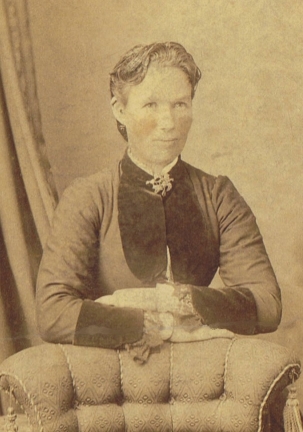
Sophia Vivian nee Goodman
Joseph Allen: Not a great deal is known about Harry's half-brother, Joseph. In 1924 he drowned while crossing a river. Click HERE for the newspaper report.
Maria Allen: Harry's half-sister, Marie Allen, married Thomas Hastie in Dunedin in 1873. They were farmers in East Taieri. They had four children: Maria (1873), Jane known as Jeannie (1876), Charlotte Ann (1879), and Thomas (1887). Maria's husband died in 1912 in Dunedin, and Maria died in 1932.
Thomas Allen: Thomas was Harry's half-brother and for many years his head stable hand in Dunedin. He married Emma Lowe, Harry's sister-in-law.They had no children. Later they moved to Trentham. Emma was hit by a car at Silverstream in 1941 and was killed. Thomas died in 1945.
Susanna Allen: In 1883, Harry's half-sister Susanna married Henrich Emil (Harry) Ackerman in Christchurch. Henrich was born in Poland. They had ten children: Henry Julius (1884), Frank Edward (1886), William Thomas (1888), Susannah Emily known as Cis (1889), Louisa Victoria (1891), Charlotte Ann (1893), Ellen known as Nell (1897), Mabel Matilda (1899), Ethel May (1900), and Emily Elizabeth (1903). The marriage broke up and Susanna was denied access to her children. She wandered the streets of Wellington with little keep. In 1914 she died tragically in a hotel fire. Click HERE for the newspaper report.
|
|
|
Harry's Children
In July 1870, at Ocean Beach Dunedin, Harry was involved in a race of another sort. A race meeting was held in the paddocks about where St Clair School now stands. A 300-yard foot race for 5 pounds was held. It was won by the well-known horse trainer, Harry Goodman, who had been given a 10 yard start. In the crowd was the 17 year old Miss Annie Lowe - undoubtedly captivated by the handsome and athletic 23 year old Harry. They were married on 5 April 1871, at the Dunedin Registry Office. James Lowe, the father of the bride, gave consent because Annie was a minor. They set up home in 6 Surrey Road, Caversham. A Presbyterian Church now occupies the site. Harry was short; Annie was a tall woman. They were to have one daughter followed by eleven sons.
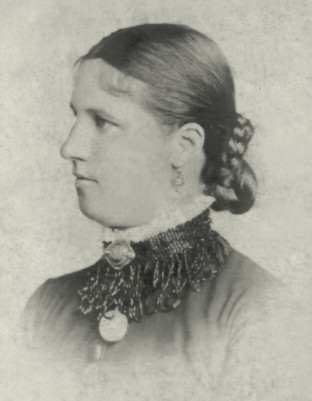
Annie Goodman nee Lowe
The Goodman children referred to their father as "The Boss".
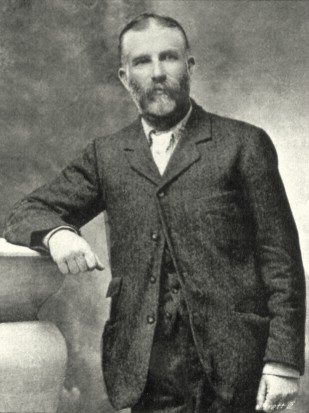
Harry Goodman
Annie Eliza Goodman: Annie was born on the 6th March 1872 in Dunedin. At the age of 23, on 23 October 1895, at Saint Peter's Anglican Church, Caversham, she married Thomas Moorehouse Buddicombe. Tommy Buddicom was one of the jockeys trained by Harry Goodman. Annie and Tom had no children. The marriage did not last. The divorce proceedings state that Buddicombe was an alcoholic. In 1924 Annie married a Londoner, William McArthur of Wellington. She died in 1948, and is buried at St John's, Trentham.
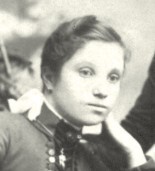
Annie Eliza McArthur formerly Buddicombe nee Goodman
Henry James Goodman: On 5 July 1873 Henry James was the first son born. Like his father, he was known as Harry. He worked as an accountant, and at one stage as a bookie. On 16 April 1901 he married Annie Mehalski in the Roman Catholic Basilica of St Patrick, South Dunedin. They lived in Surrey Street, Caversham. They had no children, and they last appear in the Dunedin Directory in 1908. Harry was arrested for illegal book-making. Around about this time they moved to Sydney, Australia. Harry Junior died there in 1944, and his wife Annie (known as "Big Annie" to distinguish her from the oldest sister who was known as "Little Annie") moved back to New Zealand where for a time she lived with Minnie and Albert Goodman at Trentham. She then moved to Dunedin where she died in 1959 aged 83.
Thomas Daniel Goodman: The second son was Thomas Daniel born on 16 September 1875. He fought in the Boer War. He represented Otago in rugby in 1903, and was the team captain. In 1905 he married Sarah Bentley Sharp, and they had four children. Tom was a carriage painter for the railways. They lived in Surrey Street. He died on 25 August 1937, aged 62.
Albert Goodman: On Sunday 6 May 1877 the third son Albert Goodman was born at Forbury, Dunedin. After his return from the Boer War, he married Martha Burgess in Dunedin, and after the marriage failed he married Minnie Elizabeth Scrimshaw of Trentham. They had five children. Albert had his own stables at Trentham where he trained horses, at first for his mother's brother, J.W. Lowe, and then for himself. He died in 1954 aged 74 and is buried at Akatarawa.
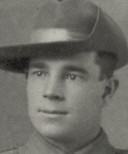
Albert Goodman
Walter Goodman: The fourth son was Walter, born on 1 May 1879. He married Marie Minotta Dunwoodie in 1904 and they had two children, Sydney and Edna. He was a labourer. They lived at 45 Richmond Street, Caversham. Newspaper reports record another person with the same name in Dunedin who was a drunk, a compulsive gambler and a general larrikin. Walter died on 25 October 1932, aged 53. He is buried in the Green Island Cemetery in Dunedin.
Arthur Goodman: The fifth son was Arthur born in 1882. When he was young, during the influenza epidemic, he was left with a serious heart weakness. He worked as a cook for a time, and lived at 51 Harbour Terrace, Dunedin. He never married, although his partner was known as "Auntie Nancy". For a time he worked as a carpenter in Palmerston North and Wellington. He was working at Queenstown's Mountaineer Hotel doing light duties when he died suddenly on 29 September 1920 aged 39. He is buried at Dunedin.
In July 1883 a new school opened at Macandrew Road. This was closer to where the Goodmans lived, so the Goodman children of school age were withdrawn from Caversham School which they had been attending. Both schools had high academic standards - classes were large and the students were made to work very hard. The head master of Caversham believed in a "ninety-six per cent pass rate". Only on Breakup Day was there a departure from the established division of the playground into "girls" and "boys".
Sydney Goodman: Sydney, the sixth son, was born in 1884 and died on 7 August 1889 aged 5 years 3 months.
Charles Goodman: The seventh son of Annie and Harry was Charles. He was born in 1886, worked as a blacksmith for the railways and as a labourer in Dunedin, and died on 25 September 1955. There is a newspaper report of him as a teenager going out and shooting rabbits and discovering a dead body wedged between rocks. Click HERE for the newspaper report. He never married, and lived with his mother until her death.
Frank Goodman: The eighth son was Frank. He was born in 1888, and died of tuberculosis aged 11 and a half on 30 March 1900. The day after Frank died, his older brother Albert left for the Boer War. Albert Goodman's oldest son, Frank, was named after him. As youngsters, both Franks shared a silver streak in their hair.
In 1888 Annie and Harry shifted house to 3 Cross Street. It is high on the hills over looking the city, harbour, coastline, Forbury Race Course and Carisbrook Rugby Park. They were to live there for twenty years. The original home has since been replaced.
Alfred Goodman: The ninth son was Alfred, born in 1890. Alf represented New Zealand in boxing in the Australian Championships, and was the New Zealand Featherweight Champion in 1911 and 1914. He worked as a bootmaker and a labourer. In 1911 he married Eveline Mary Dale. They set up home at 100 Maryhill Terrace, Mosgiel. They had at least two daughters - Eileen and Amelia.
Edward Goodman: Edward was the tenth son. He was born in 1893 and died aged five and a half years of age in 1898.
John William Goodman: The eleventh and youngest son was John William, born in 1895. At the age of 28 he married Edith Jeanette Smith of Waikouaiti on 17 October 1923. They had at least one child - June Kathleen. They lived mainly in Macandrew Road, Caversham. John worked as a hairdresser in Dunedin. John died on 20 June 1976.
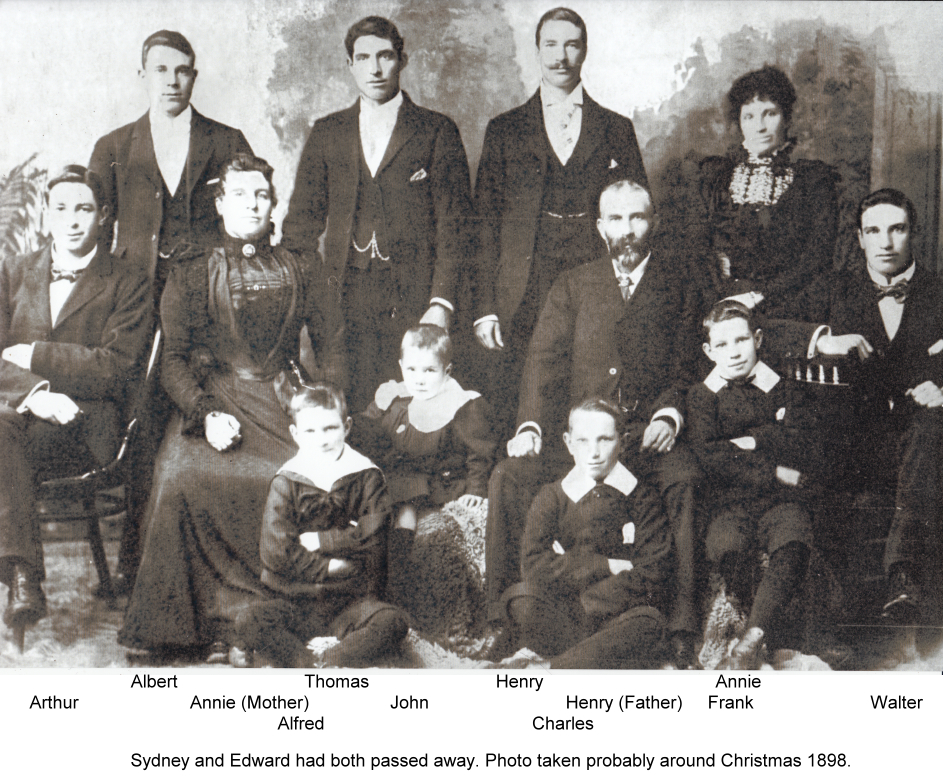
|
|
|
More Racing and Horse Training
In 1869 it was reported to the Dunedin Jockey Club that a number of people had acquired land suitable for a racecourse at Forbury to replace the course at Silverstream. The first race meeting was held there in 1871 when it was decided to lease the land for ten years. The horse trainers complained about the dangerous state of the course and training area. At the end of 1882, the club purchased additional land at Forbury, but the whole venture proved too expensive to maintain. In 1882, Harry Goodman had purchased land in Forbury to the value of 475 pounds, but the last race meeting at Forbury was in December 1898.
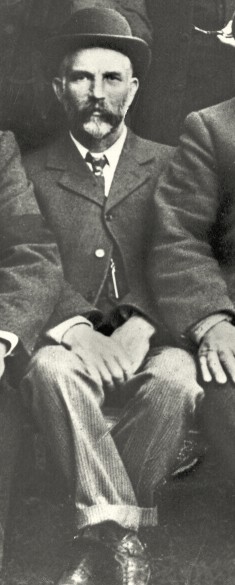
Harry Goodman at Hastings H.B.
In 1872 Harry was training for Edward Pritchard, his brother-in-law, and won at Dunedin the Pacific Handicap, the Forbury Handicap, and with Gazelle the J.C.Handicap. At one stage there was a match between Edward Pritchard's Native Cat and Bill Kirkwood's Our Pony. The stakes were 50 pounds a side. Our Pony, ridden by his owner, received five seconds start from Native Cat, who was ridden by Harry Goodman. Our Pony won, and it was rumoured that the Native Cat party lost over 2,000 pounds.
Other winners that Harry trained were Patch, Don Pedro, Sir Tatton, Fire Eater, Chance, and Chancellor. Chancellor won the C.J.C.Handicap beating Maritana which had beaten Harry the previous year setting a new New Zealand record for 2 miles. For Harry Yeand he trained Rory O'More and King Phillip. With Kathleen he won, in 1876, the Dunedin Birthday Handicap and other races. Stanley was another useful horse he trained.
A disastrous trip to Australia was made in 1881 with Sir Modred, Somnus, Idalum, and Hilarious - each of which cost Messrs. Pritchard, Proudfoot and H.Prince 1,000 guineas each. Sir Modred, who had won four races in Canterbury, only succeeded in winning the Sydney Metropolitan Handicap. The trip ended with the owners and Harry having a punch-up. After bringing the team back to New Zealand, Harry missed the Wanganui Cup with Sir Modred, but rode him and won the Wanganui Stakes and also the Dunedin Birthday Handicap.
In 1897 the crouching style of riding a race horse was developed by L.H.Hewitt. He was engaged sometime after this by Harry Goodman, for whom he won 17 races during the first season. The horses that Harry owned at this stage included Cherrystone, Black and Red, Pitch and Toss, and Swordfish.
Harry's job meant that he was often away from home attending race meetings. Frequently his wife Annie was left alone with her large family. 1900 saw Annie and Harry Goodman's son Albert at the Boer War in South Africa. Another son, Thomas, joined Albert in 1902.

Albert Goodman June 1900 Boer War
|
|
|
Yet More Racing and Horse Training
Apart from the horses already mentioned, Harry had many other good horses pass through his hands. Many he owned himself or jointly with others. They included Le Loup, York, First Lord, Tera, Titania, Blizzard, Invermay, Belvediere, Mose Rose, Billy, Apropos, Silvermark, Somneil, Violin, Glengarry, Quibble, Casket, Pitch and Toss, Euroclydon, Pygmalion, Canteen, and Solution.
Harry considered Euroclydon the best horse he ever had, Silvermark and Sir Modred good horses, Quibble a bread and butter winner, and Billy (a winner of numerous races) a consistent battler. He considered Blizzard a useful handicap horse, and Apropos, though somewhat unreliable, a brilliant mare.
To name a few more of his successes: the Dunedin Cup fell to Casket; the Dunedin Jockey Club Birthday Handicap to Kathleen, Sir Modred and Blizzard; the D.J.C.Handicap to Captain Scott, Gazelle and Blizzard; the Forbury Handicap to Gazelle and Silvermark; the C.J.C. Great Autumn Handicap to Pitch and Toss; First Lord won the Middle Park Plate; Mountebank won the C.J.C. Midsummer Handicap; Casket won the C.J.C. Great Easter Handicap; Euroclydon won the Canterbury Cup, Canterbury Derby and New Zealand Cup; Canteen won the New Zealand Cup; Apropos, Silvermark and Somneil won the C.J.C. Welcome Stakes.
At some stage Harry trained horses for Mr Robert Patterson. In 1906 Harry was training horses for Mr St.John Buckley.
From 1909 until 1912 Annie and Harry lived at 3 Sussex Street, South Dunedin. No doubt the steep hills to and from Cross Street were getting a bit much. From 1913 to 1915 they resided at 21 Nicholson Street with their son Charles. Both the house at Sussex Street and the house at Nicholson Street have been replaced.
Towards the end of his life Harry took offence at the Dunedin Jockey Club shifting to Wingatui. He vowed that he would never move his stable to the new course. It meant that rival trainers stepped ahead of him. For a time he took charge of Mr St.John Buckley's stable at Oamaru, but met with only indifferent success.
During his final years he trained for Bill Crossan, the owner of the Waterloo Hotel. With the horse Ogier Harry showed that he had not lost his ability in preparing a horse.
One of Harry's great services to racing was his tutorship. A large number throughout New Zealand acknowledged him as their racing father, and as boys were brought up in the Goodman household while they did their apprenticeship. Some of the names include Tom Buddicom (a son-in-law), Walter Buddicom, Jack Loughlin, J.W.Lowe (a brother-in-law), Tom Allen (a half-brother), Albert Hoskins, Jack McCombe, Adam King, L.Hewitt, Albert Goodman (a son), and Charlie Rudings.
|
|
|
Final Illness and Death
From the end of 1914 Harry Goodman was unwell with diarrhoea. At the beginning of April 1915 he was at the races at Christchurch with Annie and had to be attended by a doctor. Other doctors had attended him earlier, but they could not tell Annie what was wrong with him. They simply said he had an "internal complaint".
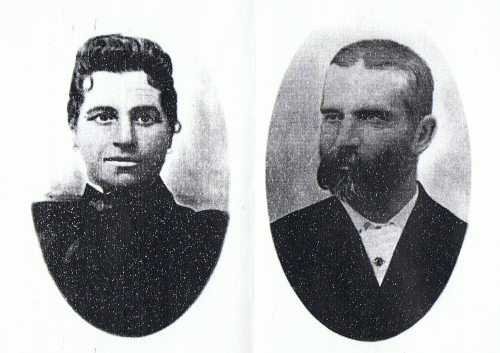
Annie and Harry Goodman
About the third week of April he was working in the stables. George Waterman, one of Harry's apprentices, takes up the story:
"I was engaged with Mr Goodman on Tuesday last trying to put a bridle on a young horse. Mr Goodman was doing it and I was assisting. He did not get the bridle on the horse. It would not keep its head down. It kept chucking its head up in the air. Mr Goodman tried to hit the horse with the twitch which he had in his hand. The horse reared up and when it was in the air Mr Goodman made a hit at it. The horse bounded forward and knocked him down on the floor. The horse struck him on the body somewhere with its front hoof."
"I picked him up and he said he was all right. He then went to brush the horse's tail out and he fell down behind its back legs. The horse stood quite still. I picked him up again and he said he was all right. I let him go and he fell again clear of the horse. I then ran up to the house and got some brandy which I gave to him. He was still lying down. I picked him up and took him to my room and laid him on my bed. He told me to go and take another horse (Ogier) and that he would be all right in a few minutes. When I came back in about an hour and a half he was in his own room which is up at the house 50 yards away. The house is Henderson's. Mr and Mrs Henderson live there..."
Harry was admitted to the Dunedin Hospital. He died two days later at 8.30 a.m. on Friday 23rd April 1915. He was 67. The doctors at the hospital wrote: "We cannot say definitely what the cause of death was." The Coroner reported that Harry had had a large hydatid cyst in the liver which burst when the horse kicked him.
Annie wrote for the Coroner: "I was the wife of Henry Goodman now deceased. He was a horse trainer and had been for many years. His usual address was Surrey Street Dunedin. He had been in New Zealand since 1860 or 1861. He came from Adelaide where I believe he was born. He has left 9 children here surviving. They are all grown up. He was working for Mr Crossan for the last 15 or 16 months and was in his employment when he died. He had not been well for sometime, perhaps 6 months."
Mr William Crossan wrote: "I am an hotelkeeper residing at Caversham. I knew the late Henry Goodman for about 40 years. He was a horse trainer. He had been employed by me for 15 months. He went all over New Zealand with my horses. He was a very careful and reliable man."
|
|
|
Legacy
To the casual acquaintance Harry was seen as hasty and outspoken, he did not put on company manners to please anybody, he never courted popularity, and was apt to give offence where none was meant. He was described by those who knew him however as a rough-and-ready man who scorned hypocrisy, was consistently loyal to his patrons, honest in purpose to everybody, and a master trainer. He was regarded as a rare horseman. Some considered him the best trainer in Australasia. In a book published in 1906 he was thought of as one of the leading horsemen New Zealand had seen.
There is a story told of him to show his integrity. A racing man visiting Dunedin entered a room where a little game was going on, and seeing only strangers whom he mistrusted, was about to back out, when Harry entered and sat in, whereupon the visitor took a hand himself, influenced by the belief that if Harry was there it would be straight. Nevertheless, Harry was very careless about money, and was constantly battling with finances.
His obituary in the Otago Daily Times said: "During his long career on the turf he never descended to any of the shady practices of racing, and he leaves behind him a record that might well be envied by others following in the great national sport."
His obituary in the Evening Star said: "Harry was a smart, well-dressed man, rather stand-off and austere in his manner; a splendid judge of a racehorse; and acknowledged as one of the best at handling a `young'un'. Unfortunately, nature endowed him with an almost ungovernable temperament, and it was a bad lookout for any horse who roused his ire. He carried this through his life, and the inquest proved that something of this nature assisted to cause his death. Be that as it may!... During his long racing career he must have made 'tons' of money, but 'easy come, easy go'."
He is buried in Dunedin Cemetery.
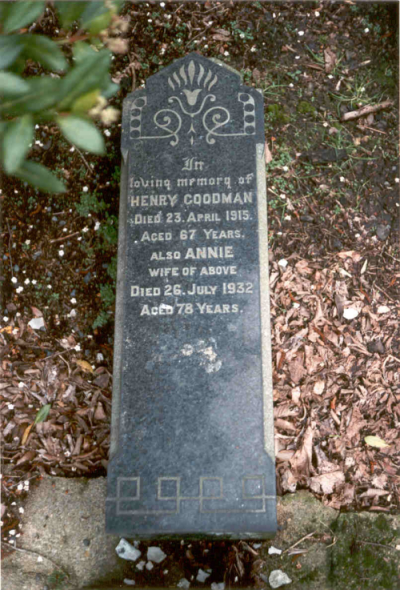
Harry Goodman's grave
|
|
 1847 - 1915
1847 - 1915 
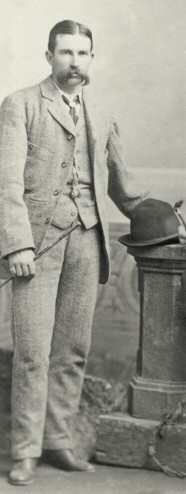
 1847 - 1915
1847 - 1915 














